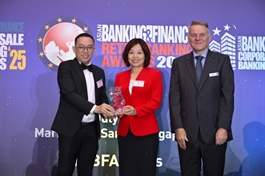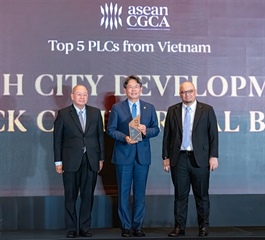Banking sector shifting focus to Vietnamese start-ups
Banking sector shifting focus to Vietnamese start-ups
According to the State Bank of Vietnam, by the end of June 2025, total system-wide credit had grown by approximately 9.9 per cent, with capital flows concentrating on priority sectors such as production, business, and notably, start-ups.

A meeting at a start-up company. Vietnamese startups are banks' new focus. VNA/VNS Photo |
The banking sector has been shifting its focus toward start-ups, reflecting a broader regulatory and institutional alignment with private sector innovation.
According to the State Bank of Vietnam, by the end of June 2025, total system-wide credit had grown by approximately 9.9 per cent, with capital flows concentrating on priority sectors such as production, business, and notably, start-ups.
This marks a notable shift in mindset among domestic banks, as many are beginning to move away from traditional collateral-based lending and toward more flexible, future-oriented credit assessment. OCB, for example, has developed specialised financial products for start-ups in partnership with venture capital firms like Genesia Ventures. These include unsecured working capital loans based on cash flow projections or future asset formation.
A new national goal drives the change. Under Resolution 68-NQ/TW, the Politburo has designated private sector development as a foundational pillar of the Vietnamese economy, emphasising the role of banks in enabling access to green finance and in supporting business models built on digitalisation, supply chain transformation, and technological investment.
Accordingly, the State Bank is directing commercial banks to prioritise credit lines for private enterprises, especially small and medium-sized enterprises (SMEs) and innovative start-ups, looking to invest in machinery, new technology, digital platforms, and green transition.
OCB CEO Phạm Hồng Hải noted that while start-up loans are often small in value, they require careful and intensive vetting. Rather than relying solely on collateral, the bank now evaluates business models, founders’ competence, capital usage plans, and projected cash flow stability. In his view, properly supported start-ups today could become large-scale enterprises, or even unicorns, soon.
M Village, a hospitality start-up currently operating 47 hotels with eight more under development, is one such beneficiary. Founder and CEO Nguyễn Hải Ninh said that each property requires approximately VNĐ20 billion in investment, resulting in high demand for medium- and long-term capital. While M Village initially relied on venture funding, the cost of raising capital continuously became unsustainable as the company scaled.
Other start-ups have also found credit markets more accessible. Many cite bank loans as increasingly attractive compared to venture capital, thanks to lower borrowing costs and more favourable terms. According to Nguyễn Hoàng, co-founder and CEO of Buymed, a pharmaceutical e-commerce platform, this is one of the rare periods in the past decade where he has witnessed strong capital flows from both domestic banks and investors into the start-up ecosystem.
The shift in perception is also apparent in the story of Dr Vi Chí Thành, who launched Brain Life Link, a start-up focused on mental health. The company is currently developing a wearable device that uses AI and neurotechnology to detect stress, burnout, and poor concentration, issuing alerts as needed. Designed and manufactured entirely in Việt Nam by a team of high-level experts, the product is priced at just VNĐ3–5 million - far cheaper than comparable international devices.
However, most early-stage start-ups struggle to access loans due to unproven business models or cash flow. Traditionally, these businesses have relied on venture capital or angel investors. However, as they gain traction, many turn to bank credit for its lower cost and more stable conditions.
To support this shift, experts argue that commercial banks must develop tailored lending frameworks aligned with the different stages of a start-up’s growth. Initial loans may be modest, just a few billion đồng, but once a business proves its viability and creditworthiness, banks can confidently scale up financing. To do this effectively, banks also need trained personnel capable of understanding start-up business models, managing associated risks and accurately evaluating growth potential.
- 08:17 29/07/2025

























